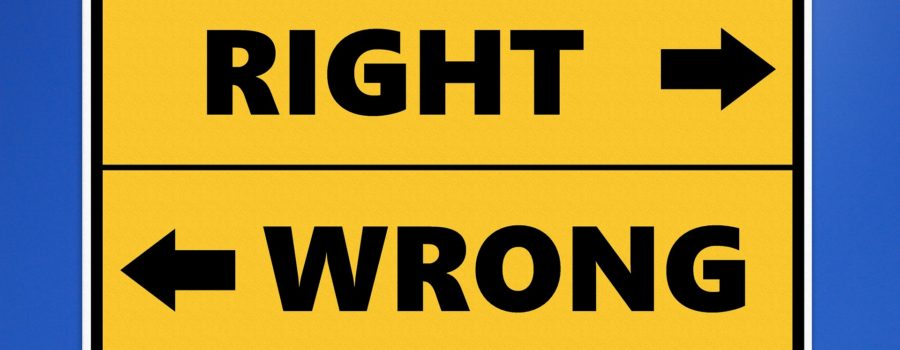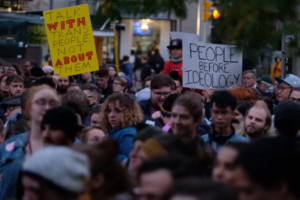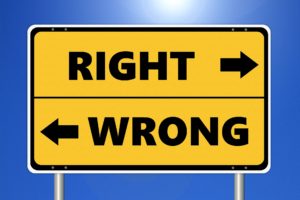If you’ve been watching the news, you may be aware that the Toronto Public Library–and specifically the city librarian, Vickery Bowles–has come under fire for agreeing to rent space to Radical Feminists Unite on October 29, 2019, for a lecture by Meghan Murphy. The discussion on the topic has, for the most part, framed the issue in terms of free speech. Take a look at these headlines (note: I’ve intentionally hunted for opinion columns and editorials rather than news stories, of which there are also many):
- Three cheers for Vickery Bowles […] who faced a storm but stood for free speech (Globe and Mail, paywalled article)
- Vickery Bowles has my respect for defending free speech and standing up to PC authoritarians (Free Bird Media)
- City librarian Vickery Bowles defends free speech (Toronto Sun)
- The silencing campaign against Meghan Murphy is a disgrace (National Post)
- Toronto Public Library’s stand for free speech (True North)
- Social justice requires intellectual freedom – why the Toronto Public Library should refuse to deplatform Meghan Murphy (The Centre for Free Expression)
I’ll make two observations about these opinion pieces, and then I’ll try to help you understand why many librarians and library workers, including myself, claim to uphold the values of intellectual freedom but still think the Toronto Public Library is making a terrible mistake.
Perhaps you can guess what unites all of the examples above: all of them are cisgendered men, and all of them are white. I assure you I’m not cherry-picking here. Despite numerous searches for other web-based media sources (apart from social media platforms like Twitter, Facebook, and Reddit), I am unable to find many published “pro-censorship” positions, with the exception of CBC’s As It Happens interview and one open letter posted on Medium. The interview stands out most starkly for its reach, of course, but it’s also a catalyst for some of the responses I’ve mentioned.
So, to be clear: the dominant stance on this issue is that free speech must be protected, and the dominant source of that stance is cisgendered and male and white. I’ll get back to why this matters in part two.
There are two perspectives I want to add to this discussion, and I have divided it into two parts. The first perspective, presented in this part, is that intellectual freedom is a critical value for librarians but that it is only one of many values that have always been shifting and (as in this case) conflict with one another. The second part, concurring with and hopefully building on a thorough analysis shared by Sam Popowitch (parts one, two and three), will cover the shift in values that is taking place in the field of librarianship, and will observe that the current “stewards” of our discipline are resisting that shift.
One: Not a value, but a system of values
In brief: this is actually not an issue of free speech (or, in the language of the Charter, “freedom of expression;” or, in broader language common to librarians, an “intellectual freedom”). More clearly, it’s not only a free speech issue. Yes, many of us (myself included) think that Vickery Bowles is misreading her own policy because her interpretation of what is “likely to promote hate” is dubious (for example, Twitter banned Meghan Murphy in November 2018 because her targeted, intentional misgendering and deadnaming of trans women and men is specifically listed as hateful conduct), and that the event should be canceled as a policy violation anyway. I want to put that aside, though, because this view is being be argued coherently by many people — including many women, at least one librarian, and other trans-identifying or otherwise non-conforming people — who spoke at a meeting of the Toronto Public Library board on October 22, 2019.
The broader point I want to make about librarianship’s system of values is that, on the whole, the Toronto Public Library’s decision is ignorant of context, was determined with a process that did not involve the community, and did not take our discipline’s other values and principles into account.
The American Library Association (ALA), through its intellectual freedom committee, has provided a long list of interpretations of the Library Bill of Rights that have all become “policy” for the Association. [For those who are unaware, the American Library Association serves as the body that, among many things, accredits library education programs across North America, and its wide scope of work guides everyone in the profession.] If you look at the list of policies on their interpretations page, you’ll note that they’ve all been added or amended at different times.
I highlight this example because it’s visible, but I also want to point out a heavily-cited book that isn’t available for free and public inspection: Michael Gorman’s Our Enduring Values: Librarianship in the 21st Century (2000). In the first chapter of the book, Gorman reviews four different conceptions of the “philosophy” of librarianship, as conceived by Ranganathan (1938), Jesse Shera (1973), Samuel Rothstein (1967), and Lee Finks (1989). Setting aside the fact that Gorman limited his analysis to four (without going into an extensive list of philosophies Gorman could have explored, where are the perspectives of people like Sanford Berman?), the very premise of Gorman’s book is that we should examination libraries’ history of varying values to look for consistencies. He says as much in the first paragraph of the introduction:
“A recent widely publicized discussion of library education seems to have encountered great difficulty in dealing with divisions between librarians and library educators. Those divisions betray a lack of consensus about common beliefs and values…”
Michael Gorman, Our Enduring Values, page 1
From all of this, we can take the following: the values that underpin our profession, and our interpretations of them, have always been changing in response to broader conditions. It’s interesting that a committee designed to support one value is interpreting policy related to all of the principles in the Library Bill of Rights, because it suggests that one value has supremacy over all others.
Let’s get back to interpretation, though, because historical interpretation of many library values appear backwards when viewed through the lens of the present. For example, while Western libraries have almost always thought of democracy as a core value, they also have a long tradition of believing that democracies only work when they’re full of the right kind of informed citizen. As a result, libraries share a long (and still continuing) tradition of censoring or being forced to censor everything from news on horse races to depictions of sex and violence and (gasp) discussions of communism. But hang on, here: that suggests intellectual freedom has been trumped by a pro-censorship value; one that suggests “librarians know best” about what information people should see, and that our mission affords us the right to curate, editorialize, and creatively-omit content that doesn’t align with the views of dominant culture (or, to be more blunt, the state). Awkward. After all, don’t libraries also value political freedom and general access to information? Absolutely! But time has taught us that libraries—despite arguments you may have heard—are not neutral, unbiased sources of information. Decisions about what to support or not support at the library are made by people who weigh those choices against all the values of the field–whatever those values happen to be at that time–in addition to considerations of impact and consequence. So: intellectual freedom is only one of many values of librarianship, and its interpretation has been fluid based on context. Perhaps more importantly, it is normal and expected for the values of librarians to come into conflict with one another.
Librarians know this… or, they ought to. In fact, the ALA’s policy on meeting rooms specifically says this:
The presence and activities of some groups in public spaces, while constitutionally protected, can cause fear and discomfort in some library users and staff. Libraries should adopt and enforce user behavior policies that protect library users and staff from harassment while maintaining their historic support for the freedom of speech.
Meeting rooms: an interpretation of the Library Bill of Rights, paragraph 1
This is, at least in part, because libraries also value equity, diversity, and inclusion.
It’s worth pointing out, here, that the Toronto Public Library’s Community and Event Space Booking policy, despite outlining “maintaining a welcoming and supportive environment free from discrimination and harassment” in its purpose, does not address the caution outlined by the ALA. Though it provides reasons why the library might deny a request, it does not provide guidance on what to do when, for example, a booking by one group makes another group feel uncomfortable or fearful. The options are “let it happen” or “cancel it,” with no guidance in the policy on contextualizing the event, consulting or engaging with the community, suggesting alternatives, or mitigating risks of harming the welcoming and supportive environment praised in the “Purpose” section. Instead, the policy prioritizes the lens of intellectual freedom—perhaps supplemented by the value of access—when determining how to handle a request for a controversial room rental. This is a policy failure.
It may be obvious by this point that I’m being loose with the terms “value” and “right” in this discussion, because the rights advocated by the ALA are not legal ones. In the context of rights, though, conversations about conflicts are not novel. In The Ethical Presuppositions Behind the Library Bill of Rights (2000; no free version available), the authors note that “few, if any, rights are absolute, unconditional, and universal, and trump everything. Most rights have limits or boundaries, and we need to pay attention to what those are.” (p. 471-72, emphasis mine). There are many examples in the paper where the right to a dissenting opinion conflicts with the preference to avoid censorship or restricting access. In situations where individual rights come into a seemingly-unresolvable conflict, the authors suggest that considering the benefits to society (tipping a hat towards utilitarianism–doing the most good for the most people, which has its own challenges) may work. The act of “considering” is not defined in the paper, but it is fraught: for one thing, who gets to do the considering? In the case of the Toronto Public Library, it’s the city librarian. Apparently librarians still “know best.”
To summarize: the values of librarianship are not sacred, they are not totally exclusive of one another, they are enacted in ways that sometimes appear contradictory, and they have always been variable and subject to interpretation.
Something is missing though. The current list of “core values” of the profession lists things like diversity, but there is nothing that says a library has to be a “safe space,” is there? And if you’re reading between the lines of my argument so far (since I think this event should be canceled, and have also written that I’m setting aside the free-speech-only argument), it seems clear that I am interpreting the values of librarianship to include “safe spaces” among them. It follows, then, that when weighing the intellectual freedom argument against principles of equity, diversity, and inclusion, Vickery Bowles’ refusal to cancel or mitigate the Meghan Murphy event is a violation of safe space principles that harms the community more than it protects intellectual freedom. So let’s examine that argument in part two.
The image at the top of this post is by Tumisu from Pixabay




